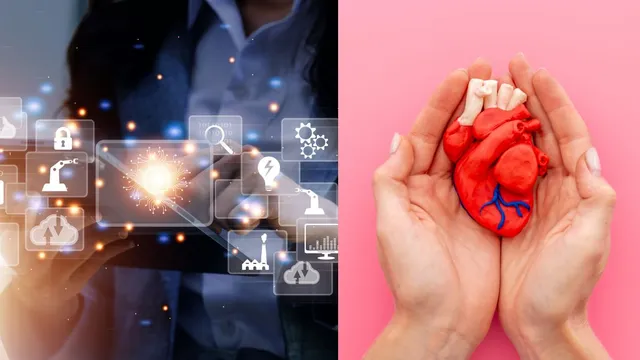- By Bornika Das
- Sat, 11 Oct 2025 06:39 PM (IST)
- Source:JND
In this age of hyperconnection, perpetual screen time and digital addiction have crept up unnoticed to become one of the largest risks to heart health. From smartphones and laptops to social media and streaming, our digital lives have accelerated to such an extent that they interfere with sleep, increase stress hormones and diminish physical activity - all of which can have a serious negative impact on the cardiovascular system. What can appear innocent scrolling or binge-watching can, in reality, trigger a perilous pattern of anxiety, bad lifestyle habits, and elevated blood pressure.
It is important to raise concern over that digital overexposure is not only impacting mental health but is also quietly stressing the heart. The body's stress system, activated by relentless notifications and web interaction, keeps the heart beating faster and blood vessels tightened for longer hours. In the long run, this cyber stress can lead to hypertension, obesity, and even atrial rhythm abnormalities. In conversation with The Daily Jagran, Dr. Haresh Mehta Director of Interventional & Structural Cardiology at S.L. Raheja Hospital - A Fortis Associate, shares how digital overload is affecting heart health and why digital detox is required.
How Digital Overload Disrupts Sleep And Strains The Heart
Sleep problems are another big worry. The blue light from electronic devices holds back melatonin production, which leads to poor sleep quality and less sleep overall. Not enough sleep has a direct link to high blood pressure, more stress hormones, and more inflammation, all of which raise the risk of heart disease and stroke. Dr. Haresh Mehta states, “Continuous notifications and digital stress raise cortisol levels, causing elevated blood pressure and inflammation, further straining the cardiovascular system.”
ALSO READ: How To Keep Your Heart Healthy This Festive Season: Cardiologist Shares Tips
Long-term stress from too much digital input sets off a chain of body responses that harm heart health. Non-stop notifications comparing ourselves on social media, and information overload trigger our body's fight-or-flight response, flooding our system with cortisol and adrenaline. This ongoing state of high alert speeds up heart rate, pushes up blood pressure, and makes arteries inflamed.
Dr. Haresh Mehta mentions, “We can't ignore the mental effects. Digital addiction often goes hand in hand with anxiety and depression, conditions that on their own increase the risk of heart problems.”
Social media use has an impact on feelings of loneliness and inadequacy, which adds to emotional stress that shows up in our hearts and blood vessels.

Digital Overload Affects Heart Health (Image Credits: Canva)
But a well-planned break from digital devices can bring about amazing heart-related perks. Dr. Haresh Mehta says, “People who cut down on screen time often sleep better, which leads to improved blood pressure and a slower heart rate when resting.” Taking a step back from tech opens up chances to move more, even simple things like a stroll or some gardening, give your heart a workout while easing stress.
You don't need to give up all tech to detox. Start small: have meals without devices, set rules for no tech before bed, and pick spots in your home where phones are off-limits. Trade scrolling time for activities good for your heart, like cooking healthy food, trying out meditation, or chatting face-to-face with friends.
ALSO READ: Why Heart Failure Cases Are Rising In Young Athletes? Doctor Explains
Regular breaks from digital life let your nerves calm down, easing the ongoing stress that weighs on your heart. Many people find that using less tech helps them eat better, sleep well, and exercise more - creating a good cycle that boosts heart health.
Your heart does best with balance, movement, and real connections with people. By being smart about how we use tech, we can look after not just our mental health, but also our most important organ.

